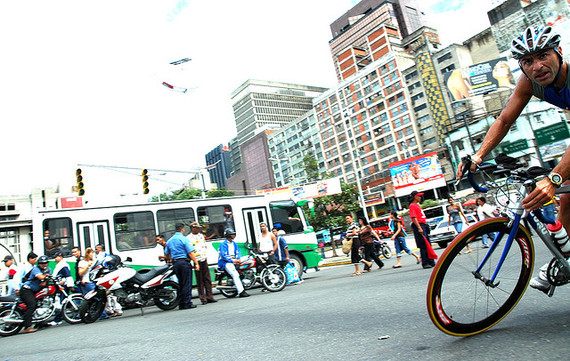By Adèle Charbonneau
Civil society is critical to policy processes that aim to tackle climate change and protect the poorest and most vulnerable communities from its impacts. Indeed, climate change has a localized impact, and civil society organizations (CSOs) are well suited to creating adaptive capacities within communities. However, CSOs can also play a role in pushing for new laws and policies and hold the government accountable. This approach is particularly valid in cities where CSOs have worked on transportation, waste management, water, and risk control, among other topics. This article presents four experiences from around the Global South of CSOs successfully promoting environmentally friendly behaviors.
Venezuela holds the highest record of CO2 emissions in Latin America. This, combined with the fact that government policies for combatting climate change are non-existent, and the few that have been implemented are insufficient, has left citizens feeling a need to take action on the ground. Marcela Scarpellini suggests Ecodelivery, a business started by a young architect Cesar Bastidas and focused around bicycles, working to change the car-focused trend in the city as a promising solution. Ecodelivery champions non-motorized transport and carries out city deliveries, from packages to restaurants to business transactions, using a small army of cyclists. The local government has also begun implementing policies to support alternative means of transport. Caracas now has a car-free Sunday on a major stretch of highway, a move supported by Urban Bike Guerillas, a group of Caracas cyclists that hit the streets in large numbers to take back the choking streets from endless congestion.
In South African cities, climate awareness has increasingly become a part of mainstream political discourse. However, according to Tariq Toffa, with few exceptions these climate strategies tend to be a projection of "first world" norms: overly narrow in their scope and disengaged from the socio-political and human rights issues that they are confronted by in their local contexts. This is where local community initiatives have become integral. In a diverse Johannesburg neighborhood, the Brixton Community Forum organized an event to engage all stakeholders to find ways to creatively build water-sensitive public and domestic spaces in city-identified densification zones. The initiative was part urban activism, part local social cohesion, and built off of previous efforts in the neighborhood, such as a pedestrian and public space proposal known as "Brixton Steps," which combines pedestrian and cycling urban infrastructure with local concerns like heritage, play, and safety. The organization also launched Alley Activation events, which simultaneously aim to build social cohesion and spatial regeneration in the disused neighborhood alleyways.
In Vietnam, HCMC citizens are all familiar with a contemporary joke saying that the city has done so well on flood control that from hundreds of flooding hotspots a few years ago, now there is only one left: the whole city. Tam Nguyen takes the example of the HCMC Steering Center of the Urban Flood Control Program, established in 2008, which advises and assists the city government in drainage and flood control programs and projects. In 2015, a youth project was developed as part of the program to improve the environment of inner-city canals and to reduce flooding. With the aim of collecting stagnated garbage, grass, hyacinth and dredging inner-city canals, the project attracted 1,200 youth during the month of implementation, many of whom were university students. Another note-worthy effort has been the Center's long-term awareness-raising project, incorporating a thematic radio program on flood control with various study tours for students to the Binh Hung waste processing factory.
Mukta Naik writes about India, where cities produce staggering amounts of waste, much of it ending up in landfills that emit greenhouse gases. This is where informal sector waste recyclers come in. Delhi has over 100,000 waste workers who collect, sort, and transport waste yet they are almost never officially recognized. A study conducted in 2009 by NGO Chintan Environmental Research and Action Group found that the recycling efforts of Delhi's informal waste workers reduced emissions by an estimated 962,133 tonnes of carbon dioxide equivalents per year. With Chintan's support, a collective of about 12,000 adult workers was registered by the name Safai Sena in 2009. A similar process of extensive research and cooperation resulted in the creation of 4R, an association of electronic waste recyclers. Global recognition for this powerful narrative came at COP21 in Paris, where a 35-year old waste picker, Mohammad Khokhan Hamid of Safai Sena, received the UN Climate Solutions Award, and Chintan bagged the 2015 United Nations Momentum for Change Award in the "Urban Poor" category.
Such initiatives highlight the innovative efforts of CSOs to tackle climate change using various strategies and levels from the youth, to the informal world, businesses and the local community. Check out more of the discussion on climate change and cities on URB.im and contribute to the debate.
Photos credits: Luke Seeman
